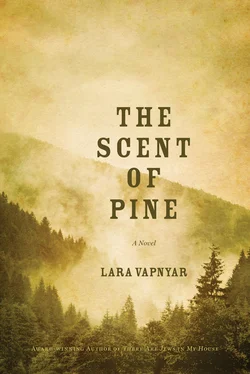
I t was never quiet in the woods at night. There would be a creepy rustle in the grass, or a branch would snap here or there, and that unceasing choir of cicadas. The smell was creepy too. It ought to have been some kind of romantic smell, something like pine sap heated by the sun during the day. There were plenty of pines, and it was a summer with a lot of warm, bright days, so couldn’t it have smelled nice at night? But it didn’t. The smell was moldy and damp and a little putrid. In daytime they could detect distinct undertones of rotten cabbage that came from the so-called Cabbage Creek, a small stream leading from the kitchen to the woods, where the kitchen guys sometimes dumped leftover cabbage soup. But at night it just smelled of decay.
Lena kept looking at their hands, bluish-white in the moonlight. Her fingers looked so thin and transparent in his. His were sturdy and warm. Yet, it was he who disappeared. Danya.
Or sometimes the story would come to her like this:
“Masturbation is very bad for boys,” Yanina Ivanovna had instructed the counselors, “bad and dangerous.” The head counselor went on listing the dangers: Memory loss. Impotence. Early death. Bad grades. She was a short beefy woman.
“Just tell them: ‘Hands over the blankets!’ ”
Lena couldn’t possibly tell the kids that. She would enter the boys’ bedroom, sit down on the edge of the windowsill, and begin a scary bedtime story in the most boring voice she could muster, developed specially for putting the kids to sleep. The room smelled like starched linen, toothpaste, and pee—some of the boys would hide their wet underpants under the mattresses. The boys in her unit were nine to eleven years old. They looked strangely alike in the soft light coming from the moon in the window and the yellow hall lamps. Shorn hair, large ears, dark skinny necks against the heavy white pillows. Eyes closed. Eyes wide open. Eyes squinted in a giggle. Eyes clouded by tears. Hands moving under the blankets seeking out comfort and peace.
As most of the eyes closed to the sound of Lena’s voice, she would walk from bed to bed moving their sticky little hands to a decent position above the blanket.
Or at other times the story would start with her friend Inka:
Inka had light brown hair streaked with pink and blue, and the longest fingernails Lena had ever seen. They shared a tiny counselors’ bedroom that always smelled of Inka’s face cream, her nail polish, and her hairspray. Sometimes Inka composed poems in her sleep. She would wake up in the middle of the night and yank on Lena’s arm, “Lenka, listen! Listen, listen.”
“What?” she would groan.
“Listen to my poem:
“ ‘Take your bread and take your spoon.
You’ll be really healthy then.’ ”
“That’s your poem?” Lena would ask.
“Yeah, I guess it sounded much better in my sleep. I might have lost some lines.”
“Inka, that’s just the camp’s call for dinner:”
‘Take your bread and take your spoon
They will serve the dinner soon.’ ”
“Oh, shit . . .” Inka would say, and, giggling, they would go back to sleep.

Lena’s train to the conference was scheduled to depart from Penn Station at 5:40 P.M. on Wednesday. At 5:41 it started to move softly, gliding farther and farther through the tunnel. Lena stored her suitcase in the rack by the toilet and went to look for a good window seat, which wasn’t that difficult since the car was mostly empty. She picked one in the middle, sat down, and unbuttoned her coat. She needed to calm down, but it was impossible. Less than an hour ago, she had run into Inka, whom she hadn’t seen in almost ten years, ever since Lena and Vadim left Russia for the United States. People from the camp kept popping up here and there in the most unexpected places. Lena rarely traveled alone, but the last two times she had, she had bumped into one or another person from the camp. She wondered if anything similar ever happened to Vadim. He had never mentioned it. Sometimes Lena thought that it was she who made all these people materialize, because every time she found herself alone, she would think about the camp intensely and try to piece the story together, as if hoping that solving the mystery of what happened twenty years ago would help her solve the mystery of her present unhappiness. A ridiculous idea! It was nobody’s fault that she was unhappy.
“Ticket, ma’am!” Lena opened her eyes and handed her ticket to the conductor. The looming brownstones of Washington Heights were rushing past. How she hated to be called ma’am!
Lena put the ticket stub in her breast pocket, folded her arms behind her head, and closed her eyes.

Ten years ago, she had run into the head counselor, Yanina Ivanovna, in New York, exiting a Century 21 store with her Russian tour group. She clearly didn’t remember Lena, but she pretended to. And about five years ago in London, she saw one of the girls from her unit, Sveta Kozlova, at the Royal Albert Hall of all places. Lena remembered Sveta as a tall, pudgy nine-year-old; she would never have recognized her in this six-foot-two-inch beauty. But Sveta had run up to Lena and lifted her off the ground with her hug. Sveta said that she was married to one of the richest men in Russia, who was now exiled to London. She kept insisting they all have a drink after the concert, and that she had something amazing to show Lena, but Lena developed a bad headache and had to leave before the concert was over. She didn’t think she would enjoy the company of glamorous “new Russians” anyway, so she didn’t regret leaving.
And now Inka. Lena had lost touch with Inka after Lena and Vadim left Russia for the U.S. years ago, but in the last few years, news of Inka had been popping up here and there. Apparently, she had become a prominent human rights activist. Her name appeared in the New Yorker, her opinion in the New York Times, a glimpse of her on CNN, her deep, lulling voice on NPR. Who would have ever believed that Inka would become famous? And as a human rights activist? Lena was both jealous and proud. She had the urge to boast that Inka and she used to be friends, best friends, but there was nobody besides Vadim to boast to, and Vadim hated when she talked about her experiences at the camp.
And now she had seen Inka in New York. By pure chance. Friends gave Lena a lift to the city, where she was supposed to take a train to Saratoga Springs, and since she had an hour before her train, she decided to go to Macy’s. She was on the first floor smelling all those perfume sticks, getting nauseous from the stench, when she noticed a plump woman, with a long nose and messy blond hair standing at a counter nearby. The woman was wearing glasses, so it was hard to see her face, but something familiar about her carriage, about the way she moved her whole body rather than craning her neck when she tried to see something behind the counter, reminded Lena of Inka. “Inka!” she yelled, impulsively, and Inka turned, removed her glasses and squealed in delight. It turned out that Inka had come to the United States to give a series of lectures about Chechnya. When they hugged, it comforted Lena that Inka felt just as soft and pliable as she used to.
Читать дальше














